Advertisement
Field Guide to Boston
Cheap eats and family beef: Why Market Basket's a whole thing in Greater Boston
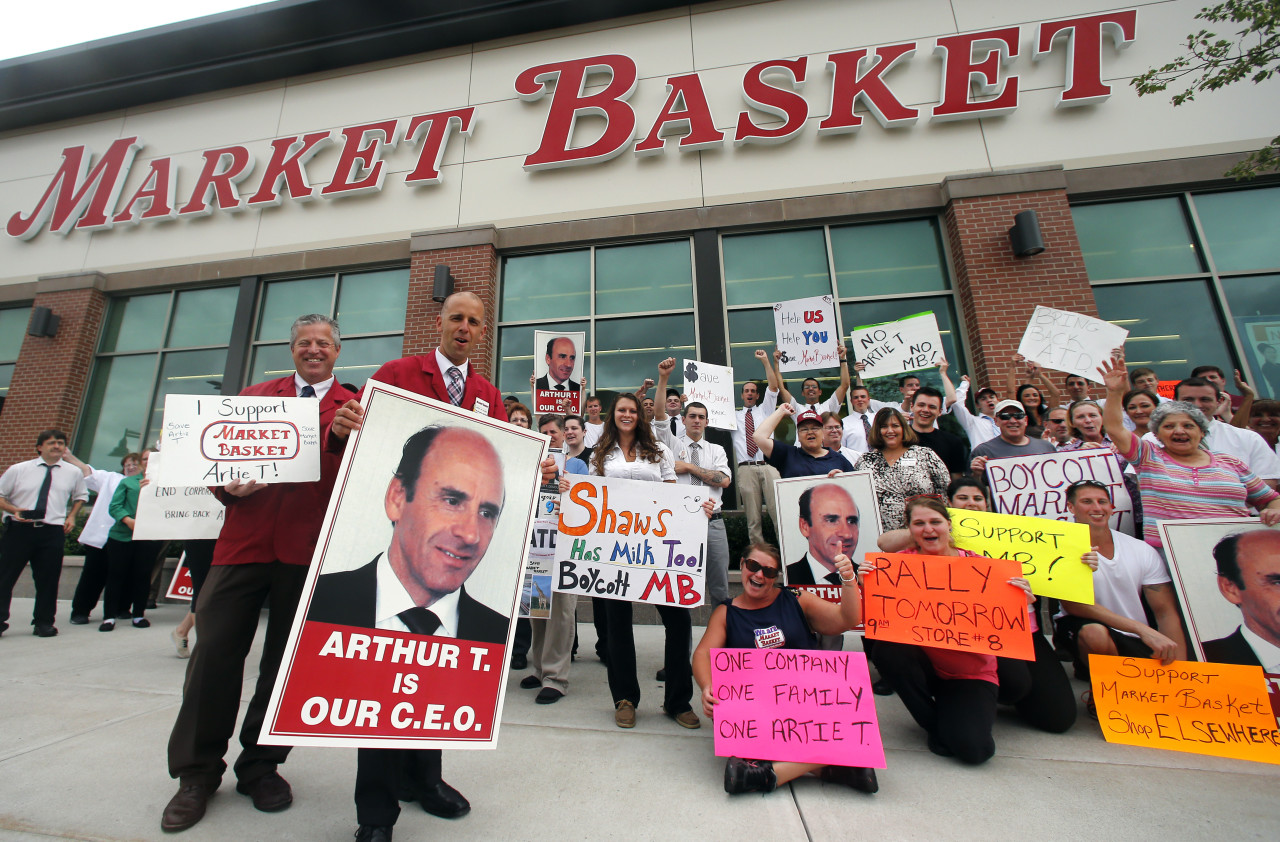
Market Basket has everything: seemingly endless aisles of groceries, low prices, a reputation for huge crowds before storms or (once upon a time) Patriots playoff games, and an intergenerational family feud that led to thousands of workers and customers taking to the streets.
All this from a regional supermarket chain. Talk about bang for your buck.
Perhaps no Boston-area retailer invokes fiercer loyalty among its customers than Market Basket. If you’re a regular, the bright-red and white sign is a beacon for bargains.
The supermarket chain got its start in Lowell as DeMoulas Market more than a century ago. It has since grown to 88 locations across New England.
Fans of Market Basket swear by the chain's low prices and friendly service, but the loyalty goes deeper than a weekly shopping trip.
In a recent Reddit thread, user echocomplex put it this way:
“It was fun when market basket opened in my neck of the woods and it felt like I was stepping into a 90s time capsule. Multiple registers v staffed with cashiers, suspiciously low prices, tile floor reminiscent of 90s grocery stores, etc.”
The store is so beloved among some patrons that it has inspired protests, songs and T-shirts and other fan merch over the years.
The vibe
With patterned vinyl tile floors and workers wearing smocks and ties reminiscent of mid-century butcher shops, walking into a Market Basket is like being transported back in time. And for many, the comfort and nostalgia that brings is part of what sells them on the experience.
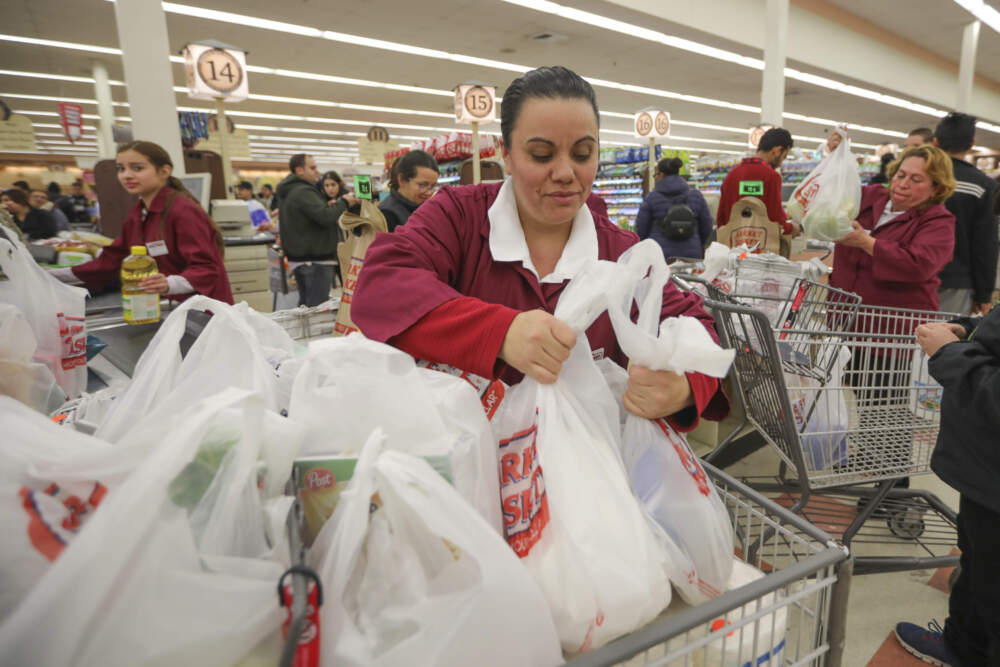
However, unless you are shopping during off peak hours, many customers warn you might have to battle thick crowds, winding shopping lines and swerving grocery carts.
Take it from this Yelp user’s review:
“My friends have always described Market Basket as ‘an experience’ and I've always thought they were being dramatic. Turns out, for once, they were not joking and this place is totally chaotic, but worth it if you can endure feeling like you're constantly dodging traffic and simultaneously like a fish swimming upstream.”
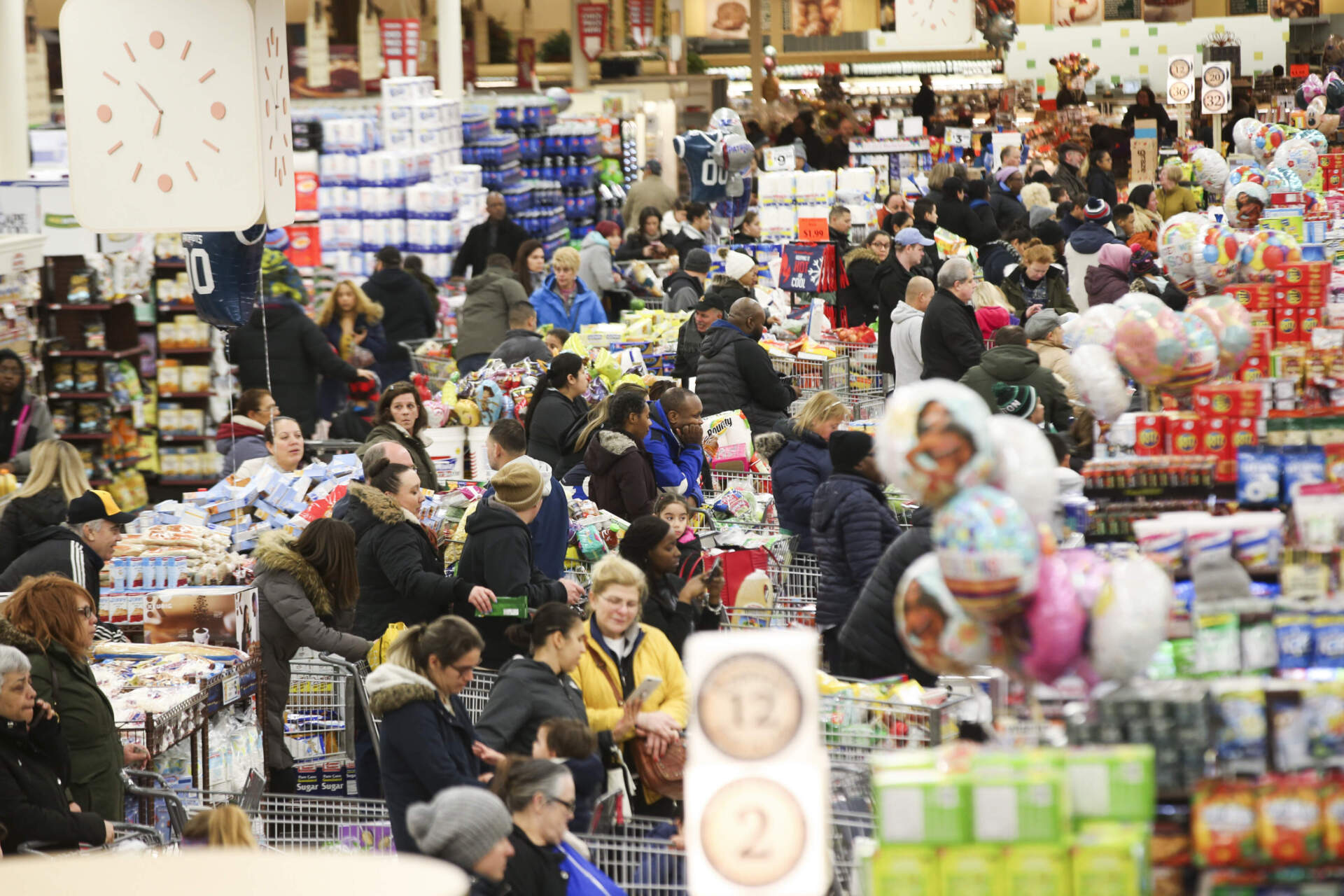
“THIS PLACE IS LIKE A DEMOLITION DERBY CROSSED BY GROCERY SHOPPING,” wrote Alex Oberle in a Google review of the Revere store.
If you’re looking to brave the cart traffic, people we spoke with at the Chelsea Market Basket location offered some tips on proper cart etiquette, with some comparing the experience to driving on the state’s busy roads.
The deals
Market Basket’s slogan is “more for your dollar,” and according to a 2022 analysis by the consumer nonprofit, Boston Consumers' Checkbook, it meets that promise.
Data show the grocer's prices were about 18% lower than its Boston-area competitors. That means a family who spends $250 each week on groceries would save $2,300 each year by shopping at Market Basket compared to other stores.
That’ll buy you more than 450 of the chain’s rotisserie chickens, or more than 250 cheese pizzas from Market Kitchen.
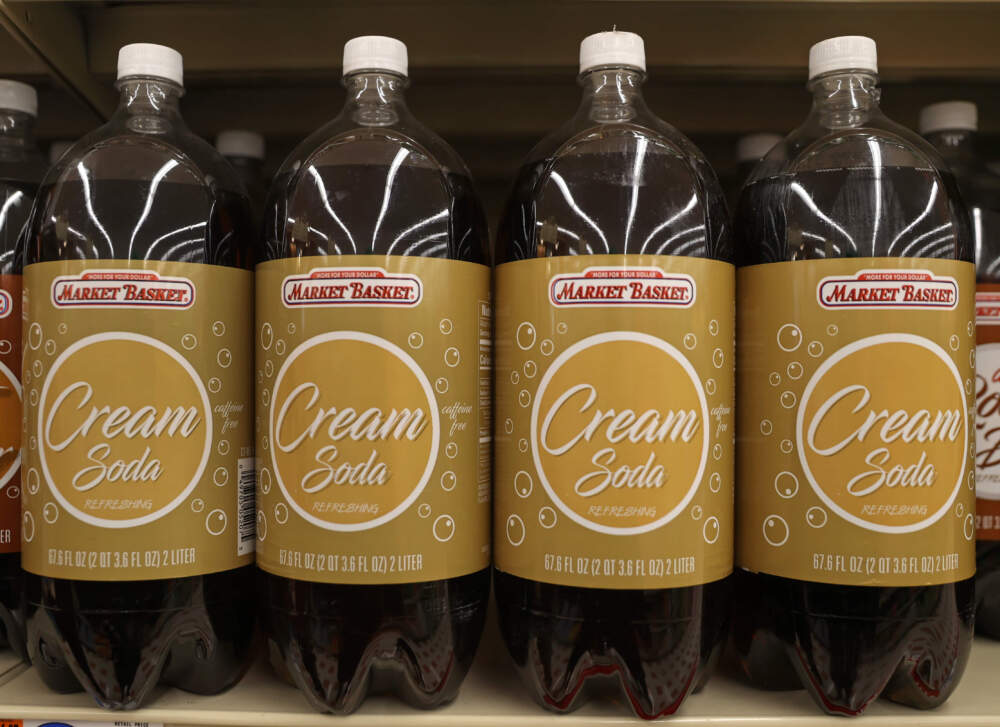
Yelp user Elizabeth L. left literal praises for the Somerville store following a visit back in 2015:
“The hype is real. BELIEVE.
Fresh (!!) produce at cheap prices. Decent meat section, well-stocked shelves (relative to city grocery). Angels we have heard on high.”
According to the study, only PriceRite and Walmart had cheaper groceries than Market Basket.
Consumers’ Checkbook ranked the store’s prices well for both produce and meat. It also found that despite its low prices, the store excels in overall quality. In a survey of shoppers, it was rated superior by 71%.
The Boston Globe’s Kara Baskin published a handy guide last year to some of the best priced items you can reliably find at the store. Some items Baskin recommends include chips, cheeses, and prepared foods from Market Kitchen, like pizza and subs.
You can also check their weekly flier in-store or online for sales.
The family beef
Market Basket started with a single location in Lowell over a century ago. It was founded in 1917 by Greek immigrant Athanasios “Arthur” Demoulas, the namesake of the original store. Many people who are longtime patrons still call the chain “Demoulas” today.
His sons, George and Telemachus “Mike” Demoulas took the market over in the ‘50s, and expanded operations into a chain of stores. When George died in 1971, the strife began. The families of the two brothers sparred over how the growing empire was shared, leading to court and boardroom battles through the coming decades.
In the summer of 2014, customers joined Market Basket employees on the picket line. At issue wasn't work conditions or price hikes, but a behind-the-scenes feud between the family who own the chain.
Longtime CEO Arthur T. Demoulas (Mike’s son), who was known for his generosity to store employees, was pushed out by his own cousin, Arthur S. Demoulas (George’s son), who was a majority shareholder.
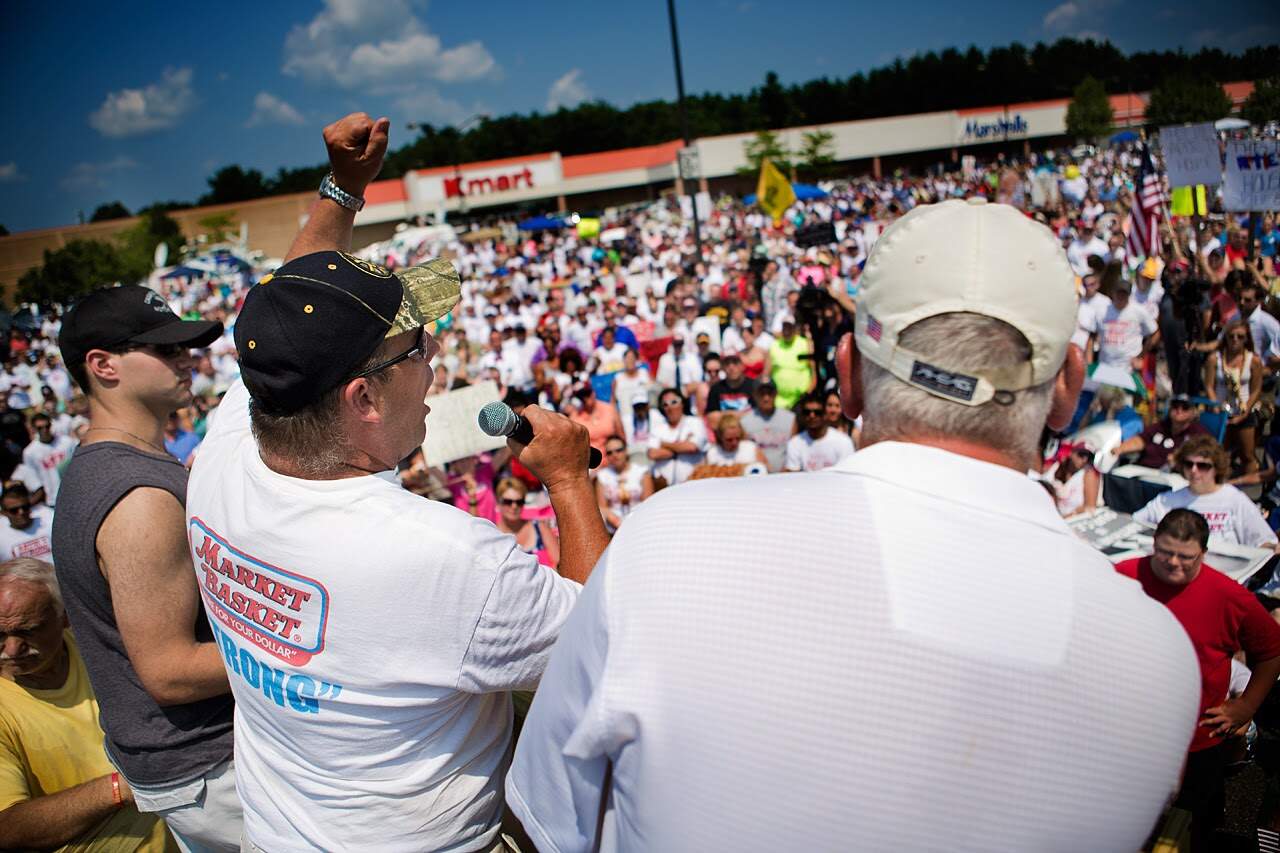
The protests started in Chelsea on July 18, 2014. Workers, managers and customers alike took to the store parking lots to picket in favor of their beloved “Artie T.” As the strike spread, thousands boycotted the store, and shelves were left nearly empty.
In the end, Artie T. was able to broker a $1.5 billion deal alongside his sisters to purchase a majority stake in the company and restore his authority.
The events captured national headlines and inspired a book, called “We Are Market Basket,” and a documentary, “We The People: The Market Basket Effect.”
The workers
Many employees also feel a strong sense of loyalty to the store, and some remain there for many years. You can tell by glancing at their name tags, which include years of service.
Reddit user scully360, who wrote that they worked at the store from 1990 to 1997, called leaving the store to take a corporate job “one of my life’s biggest regrets.”
“I left a great company that valued me, paid me well and was fast tracking me for management.... all so I could get a s----y, rat race corporate job JUST so I could get weekends off,” the user wrote.
Another user, FlatEmployment3011 shared an interesting internal motto: “Their motto is from the Basket to the Casket because they never leave the company until they die.”
The store also boasts its reputation for good customer service, and has maintained a hands-on experience. It’s one of the only grocery chains that has resisted adding self-checkout lanes thus far, with Artie T. Demoulas saying he wants “a human being waiting on a human being.”

